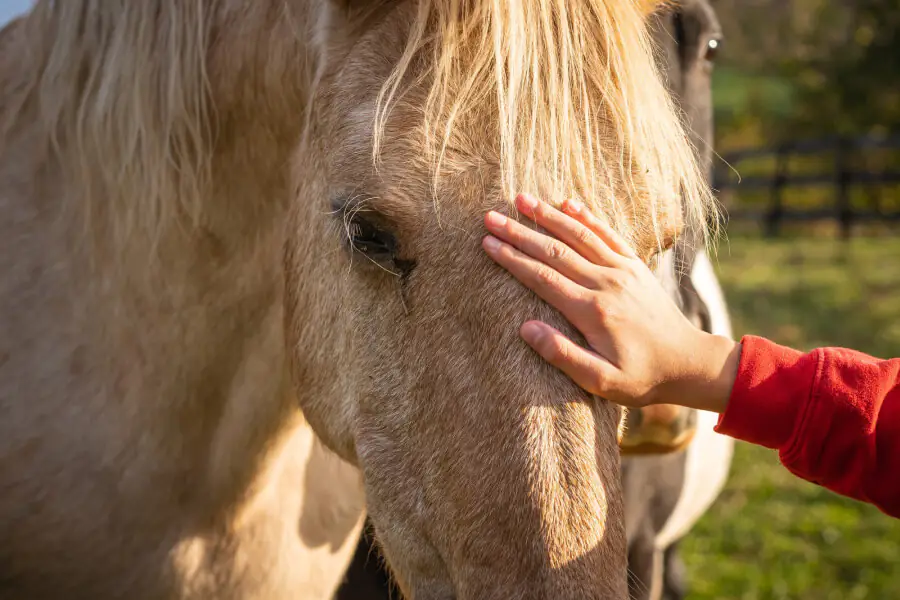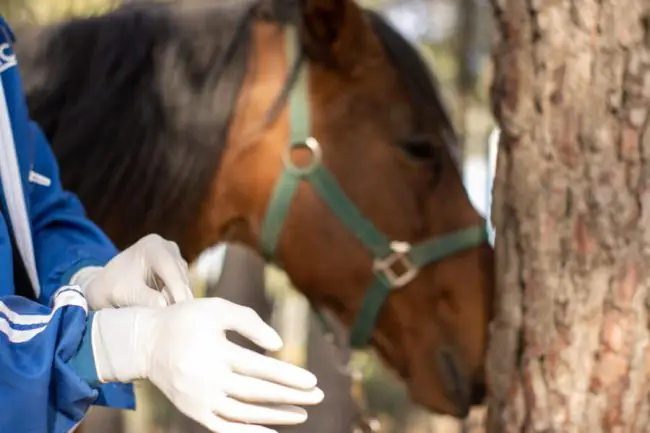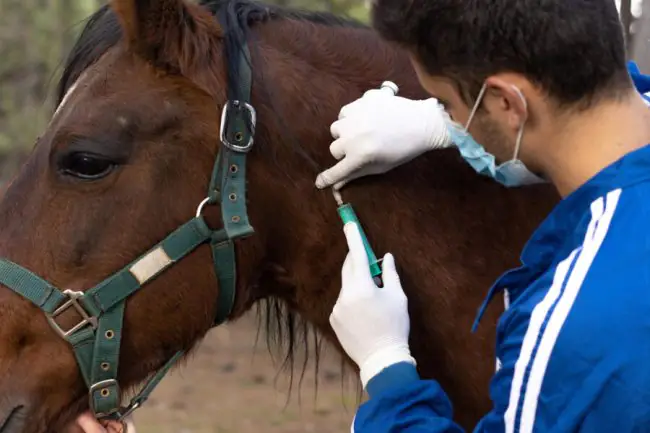Understanding common equine illnesses and taking proactive measures to prevent them can save both the horse and its owner from a lot of distress.
In this guide, we’ll explore some of the most common diseases that affect horses and discuss how you can prevent them. Whether you’re a seasoned horse owner or just getting started, it’s crucial to stay informed about your horse’s health.
Contagious Diseases in Horses
Contagious diseases in horses spread through direct contact, airborne transmission, or even through contaminated surfaces.
These diseases can spread swiftly through a stable or paddock if preventive measures aren’t taken.
Recognizing the symptoms early and implementing strict biosecurity measures can help protect your horse.
Equine Influenza
Equine influenza, commonly referred to as the “horse flu” is a highly contagious respiratory infection that spreads quickly among horses. The main symptoms to look out for include:
- Persistent coughing
- Nasal discharge
- Fever
- Lethargy
The virus spreads via the air, so horses kept in close quarters, especially in boarding stables or during transportation, are more prone to catching the illness.
To prevent equine influenza, vaccination is key. Additionally, it’s essential to isolate new horses for a few weeks to prevent them from infecting the herd if they’re carrying the virus.
Equine Herpesvirus (EHV)
Equine Herpesvirus is a group of viruses that can affect horses in various ways. It’s especially notorious for causing respiratory problems, abortions in pregnant mares, and sometimes neurological issues. There are multiple strains of EHV, with EHV-1 and EHV-4 being the most common.
Symptoms of EHV include:
- Fever
- Nasal discharge
- Respiratory distress
It’s spread through respiratory droplets and contaminated surfaces, making it vital to maintain excellent hygiene around stables and equipment.
To prevent EHV, regular vaccination is recommended, particularly for horses that travel or compete.
Minimizing contact between horses, especially during outbreaks, and practicing good biosecurity are also critical steps.
Strangles Disease
Strangles is another highly contagious disease caused by the Streptococcus equi bacteria. It primarily affects a horse’s lymph nodes, causing:
- Painful swelling
- Abscesses
- Fever
- Nasal discharge
While it rarely results in death, it can cause significant discomfort and long recovery times.
This disease spreads through direct contact with infected horses or contaminated surfaces, such as feeding equipment or grooming tools.
To prevent strangles, quarantine new horses for at least a few weeks and ensure that all stables and equipment are regularly disinfected.
Vaccination is also available and can help reduce the severity of the disease.
Equine Infectious Anemia (EIA)
Equine Infectious Anemia is a viral disease that is spread by blood-feeding insects, such as horseflies.
The symptoms of EIA can be quite subtle, with some horses only showing:
- Fever
- Weakness
- Weight loss
In severe cases, horses can become lethargic and experience swelling in the legs or lower chest.
Unfortunately, there is no cure for EIA, and once infected, horses often become lifelong carriers of the virus.
Prevention is crucial: ensure that any new horses are tested for EIA before joining your herd, and control the population of biting insects around your horses’ environment.
African Horse Sickness
Though rare in many parts of the world, African Horse Sickness is a deadly viral disease transmitted by biting midges.
Symptoms include:
- High fever
- Swelling of the head and neck
- Difficulty breathing
- Severe respiratory distress
It is a serious concern in parts of Spain, especially in areas where midge populations are higher.
To prevent African Horse Sickness, horses can be vaccinated, and efforts should be made to control midge populations. This includes using insect repellents, keeping horses indoors during peak midge activity, and managing areas of standing water where midges breed.
West Nile Virus (WNV)
West Nile Virus is another vector-borne disease, transmitted primarily by mosquitoes. Horses affected by WNV may show neurological symptoms, such as:
- Muscle tremors
- Weakness
- Lack of coordination
Preventing West Nile Virus requires vaccination and mosquito control.
Keep horses stabled during peak mosquito hours, use fly sheets or mosquito repellents, and remove standing water where mosquitoes can breed.
Vesicular Stomatitis Virus
Vesicular Stomatitis Virus causes painful blisters on a horse’s mouth, tongue, and hooves. It can affect a horse’s ability to eat and move comfortably.
The virus spreads through biting insects or direct contact with contaminated surfaces.
Preventing vesicular stomatitis involves controlling insect populations and isolating infected horses to prevent the virus from spreading.
Non-Contagious Diseases and Conditions in Horses
Non-contagious diseases and conditions often arise from environmental factors, injuries, or infections from external sources. While they aren’t passed from horse to horse, they can still be deadly if not managed properly.
Tetanus
Tetanus, or lockjaw, is a serious condition caused by the Clostridium tetani bacteria, which is found in soil. Horses are particularly susceptible because the bacteria can enter their bodies through cuts, punctures, or even surgical wounds.
Symptoms of tetanus include:
- Muscle stiffness
- Difficulty moving
- Muscle spasms
Since the disease is often fatal, prevention is vital.
Vaccination is the most effective measure, with horses needing regular boosters. Immediate cleaning and treatment of any wounds can also help prevent infection.
Rabies
Although rare, rabies can affect horses if they are bitten by infected wildlife, such as bats or foxes.
The disease causes rapid neurological deterioration, leading to aggression, disorientation, paralysis, and death. Once a horse shows symptoms, there is no cure.
The good news is that rabies is entirely preventable through annual vaccinations. Horses should also be kept in areas where contact with wild animals is minimized to reduce the risk of exposure.
Potomac Horse Fever (PHF)
Potomac Horse Fever is a bacterial disease carried by aquatic insects.
Horses typically contract the disease when they accidentally ingest insects while grazing near water sources.
PHF symptoms include:
- Fever
- Diarrhea
- Colic-like signs
- and in some cases, Laminitis (an inflammation of the hooves)
To prevent PHF, horses that live near rivers, lakes, or ponds should be vaccinated.
Reducing exposure to these insects is also important, which can be achieved by keeping stables and grazing areas well-maintained and free of standing water.
Equine Protozoal Myeloencephalitis (EPM)
Equine Protozoal Myeloencephalitis is a neurological disease caused by protozoa, which are usually transmitted through contaminated feed or water. Horses ingest these organisms, which can then attack the central nervous system.
EPM symptoms can vary, but they often include:
- Uncoordinated movements
- Muscle loss
- General weakness
To prevent EPM, minimize your horse’s exposure to opossums, which are common carriers of the protozoa, and keep feed storage areas clean and secure.
Equine Piroplasmosis
Equine Piroplasmosis is caused by parasites transmitted by ticks.
Symptoms include:
- Fever
- Anemia
- Jaundice
- Weight loss
Some horses may carry the parasites without showing symptoms, but they can still spread the disease to others.
Tick control is essential to preventing equine piroplasmosis. Use tick repellents, regularly check horses for ticks, and keep pastures well-maintained to reduce the presence of ticks.
Equine Viral Arteritis (EVA)
Equine Viral Arteritis can cause fever, respiratory symptoms, and abortion in pregnant mares. The disease is spread through respiratory secretions and can also be transmitted through breeding.
Vaccination is a critical preventive measure, especially for breeding horses. It’s also important to screen stallions and mares before breeding to ensure they are disease-free.
Preventative Measures for Horse Health
To keep your horse healthy and minimize the risk of diseases, it’s crucial to follow some basic preventative measures.
Vaccination Recommendations
Vaccination is the cornerstone of disease prevention in horses. Regular vaccinations against common diseases such as Equine Influenza, EHV, West Nile Virus, Rabies, and Tetanus should be part of every horse owner’s health routine. Consult your veterinarian for a vaccination schedule that best suits your horse’s needs and lifestyle.
Biosecurity Measures for Horse Health
Good biosecurity practices are essential in preventing the spread of diseases. This includes isolating new horses for a few weeks before introducing them to your herd, disinfecting equipment regularly, and ensuring that visitors follow proper hygiene practices when interacting with your horses.
Regular Health Monitoring Guidelines
Regular health checks help catch early signs of illness before they become serious. Monitor your horse’s behavior, eating habits, weight, and coat condition daily. Any changes, such as nasal discharge, coughing, or lethargy, should be reported to your vet immediately. Routine veterinary check-ups and dental care are also vital parts of maintaining a healthy horse.
You can check how to take care for your Horse health for a long living Here too!
Conclusion
Horses are remarkable animals, but they rely on us to keep them safe from the wide variety of diseases that can affect them. With proper vaccinations, biosecurity practices, and regular health monitoring, many of the most common equine diseases can be prevented. As a responsible horse owner, staying informed and proactive is the best way to ensure that your horse remains healthy and happy for years to come.
FAQs
How to prevent disease in horses?
Prevent disease in horses by maintaining regular vaccinations, practicing good biosecurity (such as isolating new horses and disinfecting equipment), and controlling insect populations.
What are the most common diseases in horses?
Some of the most common diseases in horses include Equine Influenza, Strangles, EHV, West Nile Virus, and Tetanus.
How to prevent horse sickness?
Prevent horse sickness by keeping your horse’s vaccinations up-to-date, maintaining good hygiene in their environment, and monitoring their health regularly.
How do you prevent horse influenza in horses?
Equine Influenza can be prevented by regular vaccinations, isolating new horses, and reducing horse-to-horse contact in crowded areas.
How can I recognize symptoms of diseases in horses early?
Early symptoms of disease in horses include fever, coughing, nasal discharge, loss of appetite, and changes in behavior or movement.







